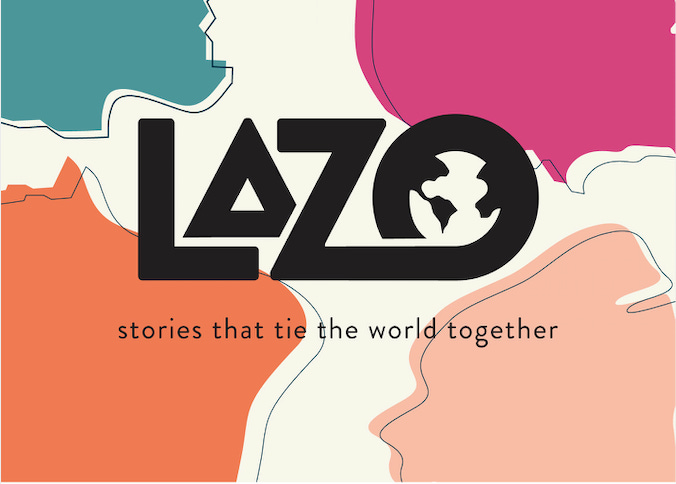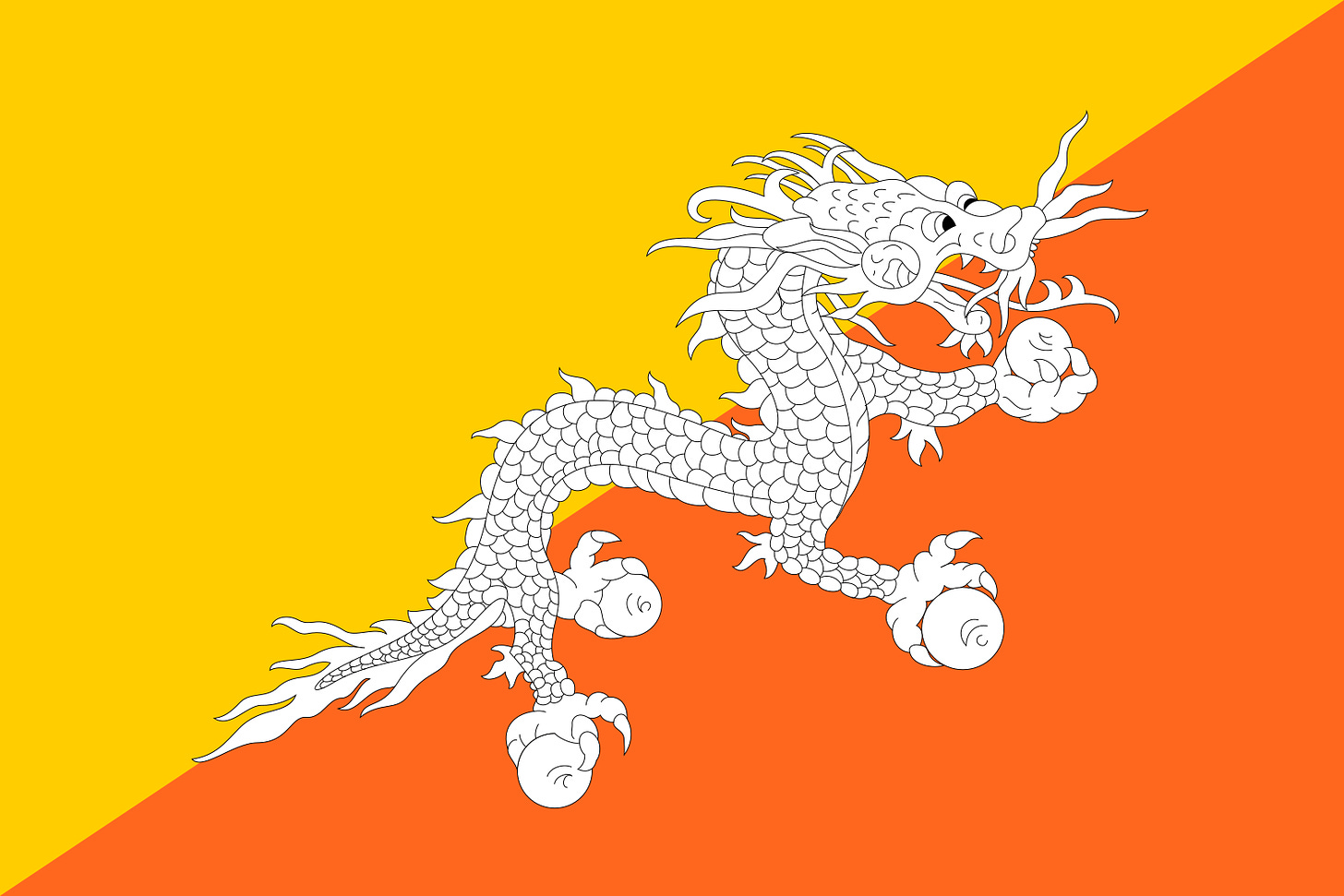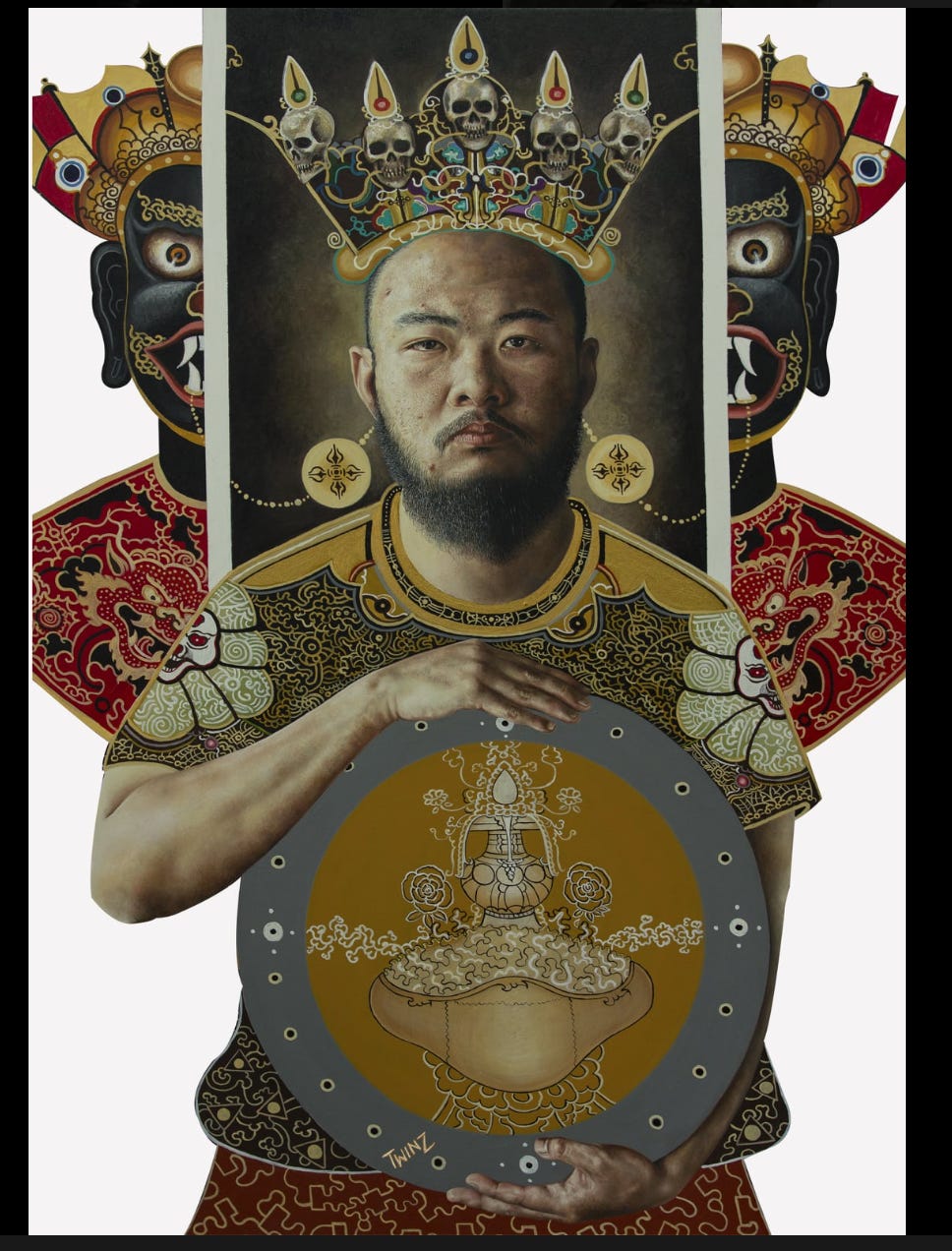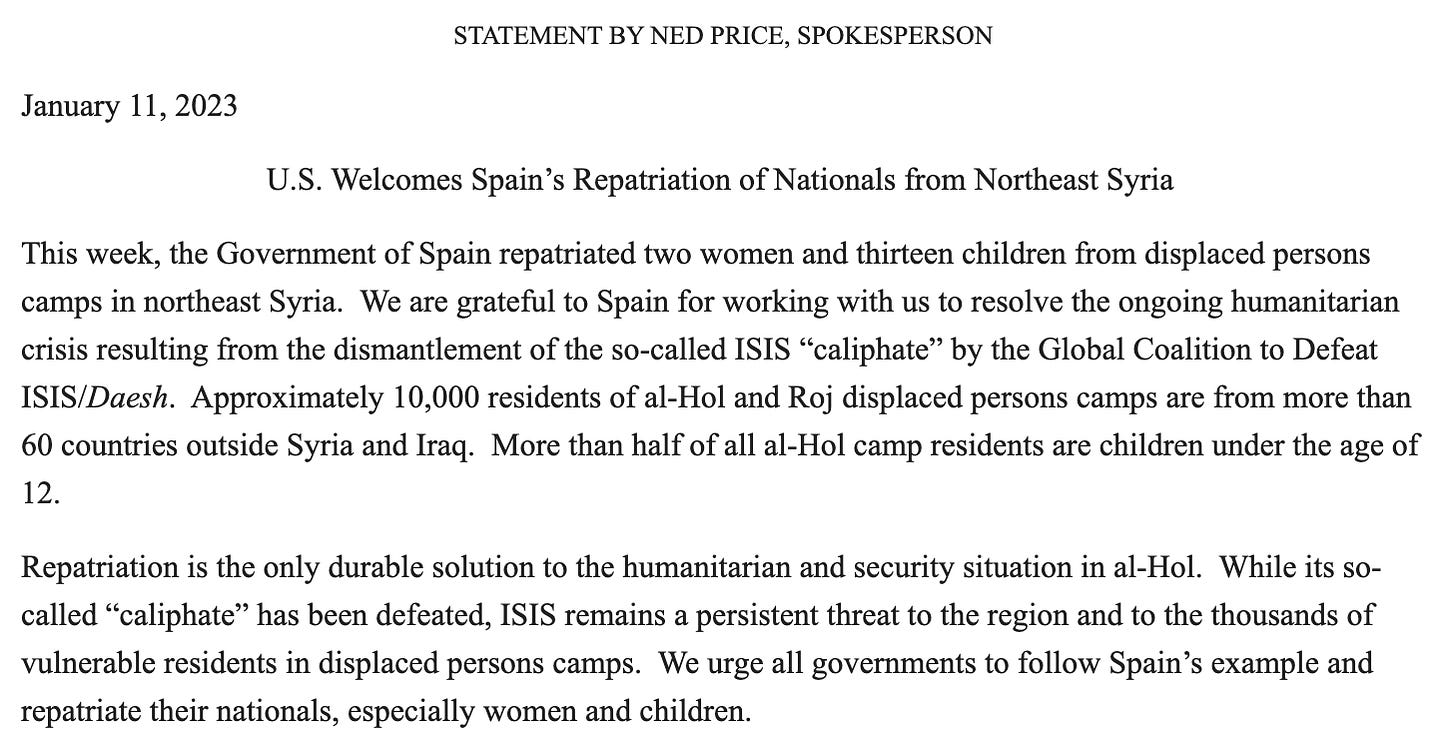#20 Bhutan
This week is about Bhutan.
Welcome to the 195 series, where I take you on a mini-tour of every country (and maybe some places that want to be countries). Each week I'll feature a new location. Some you may have heard of, while others may be new to you. The point is to learn and nurture our curiosity about the wider world. Maybe you'll find a new artist or musician you like, too.
Here's the link to copy and paste in your browser if you're interested in supporting this project: https://lazo-letters.ghost.io/#/portal/signup. You can sign up for $2 a month or $22 a year.
Country Info:
Population: Roughly 778,000.
Current government: Bhutan is a constitutional monarchy that shifted to democracy just 14 years ago. Before 2008, the country was an absolute monarchy.
The organization Freedom House writes:
King Jigme Khesar Namgyel Wangchuck formally succeeded his father in 2008. The monarch is head of state, appoints a number of high officials in consultation with other bodies, and retains a waning degree of influence over ministerial positions. The king nominates the leader of the majority party in the elected National Assembly to serve as prime minister.
In 2008, the Council on Foreign Relations interviewed the country's first democratically elected Prime Minister. They wrote:
In March 2008, Bhutan held its first parliamentary elections, shifting away from a century-old absolute monarchy. The largely Buddhist country of around 700,000 people is nestled in the Himalayas between Asia’s giants, India and China. The head of country’s first democratically elected government, Prime Minister Jigme Y. Thinley, tells CFR in an interview that the Bhutanese people were apprehensive about democracy because of the poor state of democracy in South Asia.
Languages spoken: Dzongkha is the official language of Bhutan. It is written using the Tibetan script. In case you want to learn to count in Bhutanese:
Religion: According to a 2019 report from the State Department, citing Pew Research Center data, around 75 percent of the population of Bhutan follows the Drukpa Kagyu or the Nyingma school of Buddhism. Hindus make up approximately 22 percent of the total population.
Standout artist: Tashi Dendup and Ugyen Samdrup, identical twin brothers who also happen to be artists. I'd hang their stuff on my wall.
Standout film: The film Lunana: A Yak in the Classroom, which was nominated for an Oscar in the Best International Feature category.
A surprising thing: The country, which was almost entirely isolated from the world until the mid-1970s, is the only carbon negative country. It's vast forests cover around 70% of the country.
Story of the week: Atlas Obscura has a story this week about a festival in Bhutan where performers dance naked to ward off evil spirits.
“The dance that will be performed soon was created by the great tantric master, Dorje Lingpa, in the 14th century,” Sangye said. “He came here to help the locals build a temple, but a swarm of evil spirits played havoc with the work. The master created the dance to distract the spirits, and while they were held mesmerized, the temple was completed. The dance has been performed here in Bumthang every year since, and it is very holy. When the dancers show their treasure, they frighten off evil spirits and bless the audience. All sentient beings come into this world thanks to the treasure.”
Sixteen visibly intoxicated men came staggering out of the temple. They had wound long strips of cotton cloth around their heads, so only their eyes were visible. But other than that, they were stark naked. The tantric temple dances are normally performed by young monks, but this particular dance is performed by selected men from the surrounding valleys.
Know something I don't about Bhutan? Get in touch or leave a comment.
What I'm writing:
• In the roughly 11 months that Ukraine has defended its sovereignty against Russian invaders, a pattern has emerged in how Western military aid arrives in the country.
Ukraine tells its Western allies that specific military equipment is needed to win the war. That might be a High Mobility Artillery Rocket System, Patriot missile batteries, heavy fighting vehicles, or something else. The U.S. and Germany then resist the request and say the equipment would escalate the war, or that it would fail to make a dent in the war effort. Weeks drag on. Russia commits more atrocities against its neighbor. Eventually, Ukraine’s Western partners respond to Moscow’s brutality by sending the Ukrainians what they requested.
The latest iteration of this pattern involves battle tanks, which have recently become the subject of intense debate in Washington and across European capitals. You can read the full story about battle tanks for free here.
• The budding rapprochement between Turkey’s President Erdoğan and Syria’s Bashar al-Assad worries Washington’s Kurdish allies, who are looking to the United States to save them from a potential onslaught. This story is unlocked and free to read.
With the war in Ukraine raging and the U.S. withdrawal from Afghanistan creating an uptick in refugees, the war in Syria has gotten little attention from Congress. @CrisLeeMaza reports (unlocked):https://t.co/MLCpgQQGcx pic.twitter.com/rgWU0wRqoQ
— National Journal (@nationaljournal) January 9, 2023
• I spoke to the former U.S. ambassador to Russia, John Sullivan, who retired at the height of the war in Ukraine. We discussed who has Putin's ear, whether Russia will use nukes, and why Russian intelligence failed in Ukraine, among other topics. This was his response to my question about who is closest to Putin:
What I'm reading:
Great photograph by Sergey Ponomarev in The New York Times today of Uzbek truckers having lunch as they wait for their turn to cross the Georgia-Russia border. pic.twitter.com/GoIli2mmv3
— Caroline Eden (@edentravels) January 13, 2023
• The Foreign Policy Research Institute has a report about whether Russia will survive until 2084. "As a result of a combination of a military defeat, domestic political chaos, economic malaise, and continuing demographic decline, Russia’s borders could implode to the extent they resemble those at the close of the 16th century, known in Russia as the Time of Troubles," the report determined.
• Thousands of protestors supporting Brazil’s former President Jair Bolsonaro stormed the presidential palace, Congress, and the Supreme Court in Brasília last weekend, the Wall Street Journal reports. The protesters called for military intervention to remove President Luiz Inácio Lula da Silva. Bolsonaro criticized his supporters who stormed government buildings.
• Brazilian authorities discovered a draft decree proposing the introduction of a state of defense to overturn the result of the country’s presidential elections in the house of Bolsonaro’s justice minister, CNN reports.
• The Biden administration is facing pressure from Congress to expel Bolsonaro from the U.S., where he has been staying since leaving office, the Financial Times reports.
• The Russian paramilitary organization Wagner Group claimed victory in the eastern Ukrainian town of Soledar, the New York Times reports. The claim that the town is now under the control of Wagner Group mercenaries could not be verified and was rejected by Ukrainian officials.
Putin ally and Wagner leader Prigozhin claims his murderous Russian mercs have seized control of Soledar, suburb of Bakhmut, and its salt mines belonging to Ukraine’s Artemsil. But Ukrainian forces still posting videos from western Soledar, evidence that part of it still holds. https://t.co/PT5x3QdIOQ
— Christopher Miller (@ChristopherJM) January 11, 2023
• U.S. officials are tracking the efforts of the Russian paramilitary organization Wagner Group outside of Ukraine. According to cables obtained by Politico, officials are gathering intelligence on the group's activities in countries like the Central African Republic, Mali, and Serbia.
• Russia replaced the general in charge of military operations in Ukraine. Russia’s Defense Ministry announced that General Valery Gerasimov, chief of the Russian General Staff, would become the overall commander of the campaign, with the current commander, Sergey Surovikin, becoming one of his three deputies. CNN has the story.
• More than 200 Russian doctors signed a petition to Russian President Vladimir Putin urging him to give medical care to jailed opposition politician Aleksei Navalny, the New York Times reports. Doctors across Russia said they cannot stand aside and watch how Navalny’s health is being “deliberately harmed.” The letter is a rare example of public criticism of the Kremlin in post-invasion Russia.
• The docking of a Russian merchant ship last month at South Africa’s largest naval base prompted questions from U.S. officials, the Wall Street Journal reports. The ship, whose owner allegedly carried weapons for the Kremlin, turned off its transponder before docking at the base, where it delivered and loaded unidentified cargoes.
• Following his acquittal on fraud charges, former Czech prime minister, oligarch, and media owner Andrej Babiš is one of three leading contenders in the Czech Presidential election. Eight candidates are competing to replace Miloš Zeman, who has been criticized for overstepping his role and being pro-China. Al Jazeera has the story.
• The Spanish Supreme Court dropped sedition charges against former Catalan president Carles Puigdemont, Politico Europe reports. Puigdemont and two other Catalan separatist leaders still face charges of disobedience and embezzlement.
• Sweden can’t meet some of the demands made by Turkey in order for the Nordic nation to join NATO, Sweden’s prime minister said. The Wall Street Journal has the report.
• FBI counterintelligence agents raided a building last fall as part of an investigation into Chinese police outposts operating in the U.S. without jurisdiction or diplomatic approval, the New York Times reports.
• Former Iranian deputy defense minister Alireza Akbari was sentenced to death after being convicted of spying for the U.K. Akbari, who had lived in Britain for a decade as a dual citizen, was arrested in 2019 in Iran on allegations of being a “super spy” for MI6, the U.K.'s foreign intelligence service. The BBC has the report.
• Israeli Supreme Court President Esther Hayut warned that the Netanyahu government’s plan to overhaul Israel's judicial system is aimed at “crushing” the independent judiciary and, if implemented, will “deal a fatal blow” to the country's democracy. Axios has the story.
• At least 17 people died in fresh clashes between supporters of the former Peruvian president and security forces in south-eastern Peru, the BBC reports.
• Peru is reeling as police unleash deadly violence on Pedro Castillo’s supporters, ramping up anger and inciting more protests and blockades, the Guardian reports.
• Peru’s top prosecutor launched an inquiry into President Dina Boluarte and key ministers over weeks of violent clashes following the ouster of former President Pedro Castillo, the BBC reports. Boluarte, Prime Minister Alberto Otárola, and the country’s defense and interior ministers are being investigated on charges of "genocide, qualified homicide, and serious injuries."
• The arrest of Luis Camacho, a prominent opposition leader, for his role in the alleged coup following Bolivia’s contested 2019 presidential election has aggravated political polarization in the country, World Politics Review reports.
• Tigrayan forces in northern Ethiopia started handing over heavy weapons in line with a peace deal to end the civil war in the country, the BBC reports.
• Germany and France dispatched their top envoys to Ethiopia to revamp relations strained by the Tigray conflict. DW asks whether Berlin and Paris can reset strained EU-Ethiopia ties.
• Ethiopia’s defense forces said members of the Amhara special force - allies of the federal government - started withdrawing from the Tigrayan city of Shire and its surrounding area. The BBC has the story.
What the State Department says:
You can write to me for any reason: c.maza@protonmail.com.










